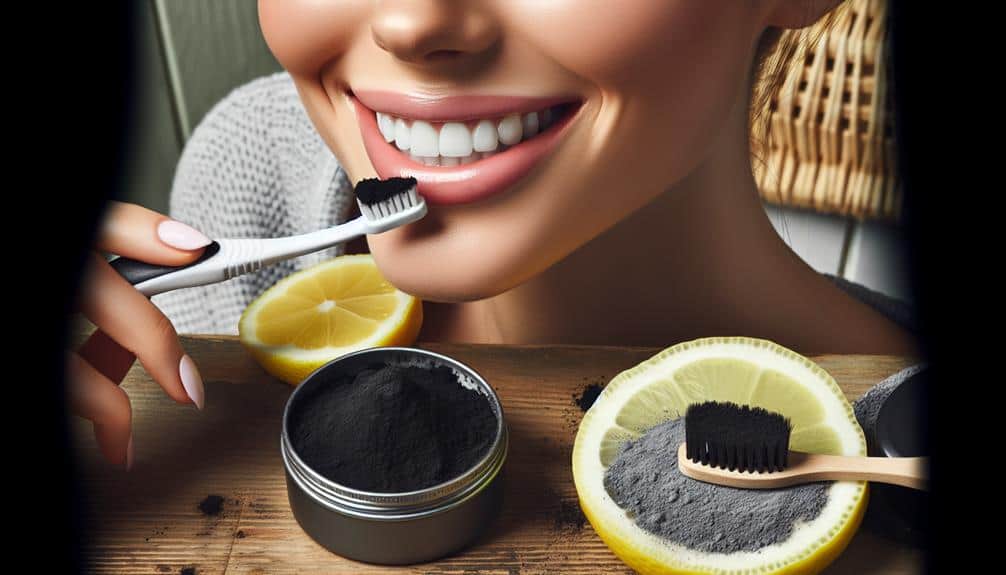Brighten your smile effectively with natural lemon juice whitening techniques. This method utilizes citric acid and antioxidants for oral health and skin brightening benefits. Dilute lemon juice with water to protect enamel, apply it to teeth, and gently rub for a minute. Rinse your mouth thoroughly after the process and repeat weekly for gradual whitening. Remember, moderation and proper application techniques are key to safeguarding tooth enamel and preventing sensitivity. Enhance your results by using baking soda or coconut oil alongside lemon juice for better outcomes.
Key Points
- Dilute lemon juice with water to protect enamel while whitening teeth.
- Limit contact time of lemon juice on teeth to prevent enamel erosion.
- Rinse mouth thoroughly after using lemon juice to neutralize acidity.
- Incorporate baking soda or coconut oil for enhanced whitening results.
- Follow safe application practices to safeguard tooth enamel and gum health.
Benefits of Lemon Juice Whitening
When whitening with lemon juice, its natural acidic properties can help brighten your skin and diminish the appearance of dark spots. Lemon juice is a natural alternative that offers various benefits for oral health as well. The citric acid present in lemon juice has antimicrobial properties that can help combat bacteria in the mouth, thereby contributing to improved oral hygiene. Additionally, the vitamin C content in lemon juice promotes gum health by reducing inflammation and strengthening blood vessels.
In addition to its oral health benefits, lemon juice is a cost-effective and easily accessible natural alternative for skin brightening. The citric acid acts as a gentle exfoliant, removing dead skin cells and promoting cell turnover, resulting in a more radiant complexion. Additionally, the antioxidants in lemon juice can help neutralize free radicals that contribute to skin aging, making it a valuable addition to your skincare routine.
Lemon Juice Teeth Whitening Recipe
To enhance the benefits of lemon juice for oral health, consider incorporating a simple yet effective Lemon Juice Teeth Whitening Recipe into your dental care routine. This recipe utilizes safe application methods and natural ingredients to help whiten your teeth gradually.
Start by mixing freshly squeezed lemon juice with an equal amount of water to dilute its acidity, which can be harmful to the enamel. Next, soak a clean cotton ball or cloth in the lemon juice mixture and apply it to your teeth, ensuring to avoid contact with your gums. Gently rub the solution on your teeth for about a minute, then rinse your mouth thoroughly with water.
Repeat this process once a week to prevent enamel erosion while effectively removing surface stains. Remember that moderation is key when using lemon juice for teeth whitening, as excessive application can lead to enamel damage. By following this simple recipe with care, you can harness the natural whitening properties of lemon juice for a brighter smile.
Precautions for Lemon Juice Whitening
Exercise caution when using lemon juice for teeth whitening to prevent potential enamel damage and maintain oral health.
Lemon juice is acidic and can erode the essential layer of tooth enamel over time if used excessively. Enamel is crucial for protecting your teeth from decay and sensitivity. The acid in lemon juice can weaken enamel, leading to increased sensitivity when consuming hot or cold foods and beverages.
To minimize the risk of enamel damage, consider diluting the lemon juice with water before applying it to your teeth. Additionally, it's advisable to use a straw when consuming lemon juice to reduce its contact with your teeth.
After using lemon juice for whitening, rinse your mouth thoroughly with water to help neutralize the acidity. Remember, moderation is key when using natural remedies like lemon juice for whitening to safeguard your tooth enamel and prevent sensitivity.
Lemon Juice Whitening Dos and Donts
For effective and safe whitening with lemon juice, make sure proper application techniques are followed to safeguard your enamel and oral health. When using lemon juice for teeth whitening, it's essential to adhere to safe practices to prevent any harm to your teeth and gums. Here are some dos and don'ts to keep in mind:
- DO dilute lemon juice: Mix lemon juice with water or baking soda to lessen its acidity and reduce the risk of enamel erosion.
- DON'T leave lemon juice on your teeth for extended periods: Limit the contact time of lemon juice with your teeth to avoid damage.
- DO rinse your mouth thoroughly after using lemon juice: This helps in removing any residual acid from your mouth and teeth, reducing the risk of erosion.
Enhancing Results With Lemon Juice
Enhance the effectiveness of your lemon juice whitening routine by incorporating proven techniques and complementary practices.
To improve effectiveness, consider using natural alternatives such as baking soda or coconut oil alongside lemon juice. Baking soda acts as a vital abrasive, aiding in the removal of surface stains when mixed with lemon juice. It also helps balance the pH levels in your mouth, promoting a healthier oral environment. Coconut oil, known for its antimicrobial properties, can complement the whitening effects of lemon juice by reducing bacteria that cause plaque and oral issues.
Additionally, timing is essential when using lemon juice for whitening. Limit exposure to around 1-2 minutes to prevent potential enamel erosion. After application, rinse your mouth thoroughly with water to remove any acidity residue. Consistency is key; for best results, incorporate these techniques into your oral care routine 1-2 times a week.
Frequently Asked Questions
Can Using Lemon Juice for Teeth Whitening Cause Sensitivity?
When you depend on lemon juice for teeth whitening, it's important to remember that sensitivity could arise. To safeguard your dental health, take precautions like diluting the juice, limiting frequency, and monitoring duration for effective yet gentle results.
How Often Should I Use Lemon Juice for Whitening My Teeth?
For effective teeth whitening using lemon juice, apply it 1-2 times a week to prevent enamel erosion. Safely dilute lemon juice with water to reduce acidity. Remember, moderation is key to maintaining effectiveness without causing harm.
Are There Any Side Effects of Using Lemon Juice for Teeth Whitening?
When contemplating lemon juice for teeth whitening, it is crucial to be cautious about potential long-term effects. Precautions include limiting exposure to acidic erosion. Explore alternative methods like professional whitening for effectiveness without compromising your dental health.
Can Lemon Juice Whitening Techniques Be Used on Dental Work Such as Crowns or Veneers?
Yes, lemon juice whitening techniques can be damaging to dental work like crowns or veneers. The acidity in lemon juice can harm the materials used in these procedures, leading to long-term effects such as enamel damage.
Will Lemon Juice Whitening Damage Tooth Enamel Over Time?
Avoid using lemon juice for whitening as it can harm your enamel over time. The acidity in lemon juice erodes enamel, leading to sensitivity and decay. Protect your enamel by choosing safer whitening options recommended by dental professionals.



